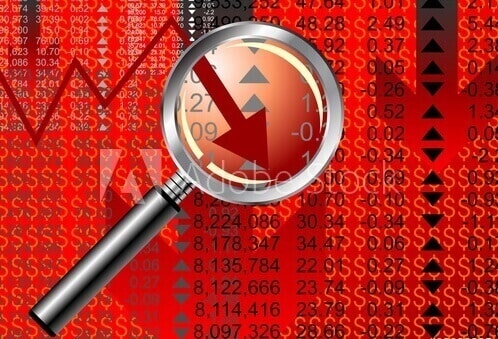What Determines Stock Price
Market forces determine the stock prices. The price of shares and bonds are governed by the dynamics of supply and demand in the market. There are several factors that affect the price movement in the stock market. There are two aspects in the stock exchange: buyers and sellers that determine stock’s price at the most fundamental level. If you are willing to buy, you have to place a buy order, which will be matched with the sell order of the person who is willing to sell. Professional traders buy and sell shares all day long to earn profits. Thus influential factors are fundamental factors, market sentiment, and technical influences. Fundamental factors include the company’s performance and profitability, while technical factors are a mix of external factors, some of which indirectly affect the fundamental factors. The market sentiment, also sometimes called the investor sentiment, is the individual and collective psychology of market participants.
Fundamental factors
The Fundamental factors are a combination of two things: The Earnings per share, which is the performance of the company, and the valuation multiple, which is its profitability. The level of the earnings base is represented by measures such as EPS, cash flow per share, dividends per share.
Earnings per share
The purchase of stock also means the purchase of a proportional share of an entire future stream of earnings. This is why we have the valuation multiple, which is the price you are willing to pay for the future stream of earnings. Some of these earnings may be distributed as dividends, while the rest is reinvested by the company. Future earnings are a function of the current level of earnings and the expected growth in this earnings base.
The Valuation Multiple
The valuation multiple expresses future expectations. It is based on the discounted present value of the future earnings stream, which is itself a function of inflation and the perceived risk of the stock. Factors that determine the valuation multiple includes:
1. The expected growth in the earnings base
2. The discount rate used to calculate the present value of the future stream of earnings
A higher growth rate will earn the stock a higher multiple, but a higher discount rate will earn a lower multiple. Since the discount rate is a function of risk, a riskier stock earns a higher discount rate, which, in turn, earns a lower multiple. Second, as a function of inflation, higher inflation earns a higher discount rate, which earns a lower multiple. This implies that future earnings are going to be decreased in value during inflation.
Market sentiment
Market Sentiments
Market sentiment refers to the overall attitude of investors toward a particular security or financial market. It is the feeling or tone of a market, or its crowd psychology, as revealed through the activity and price movement of the securities traded in that market. In broad terms, rising prices indicate bullish market sentiment, while falling prices indicate bearish market sentiment. Market sentiment is often subjective, biased, and obstinate. For example, you can make a solid judgment about a stock’s future growth prospects, and the future may even confirm your projections, but in the meantime, the market may myopically dwell on a single piece of news that keeps the stock artificially high or low. And you can sometimes wait a long time in the hope that other investors will notice the fundamentals. Some investors profit by finding stocks that are overvalued or undervalued based on market sentiment. They use various indicators to measure market sentiment to determine the best stocks to trade. Popular sentiment indicators include the CBOE Volatility Index (VIX), High-Low Index, Bullish Percent Index (BPI), and moving averages.
Technical causes
Interest rates
The investment bank, IPO, and other business institutions often increase or decrease the interest rates for stimulating or stabilizing the economy of earnings. The modification of interest rates affects the profitability and revenues that have an impact on the share price.
Inflation
The process of inflation in the business market often delays the sale volume of stocks and thereby driving down profits. It also results in a steep inclination in the interest rates that decreases the share price for shareholders.
Deflation
Deflation causes reduced profits along with a decline in economic activities. It causes the share prices to drop and encourages traders and investors to make a shift to bonds and other broker-dealer investments of fixed-term rate and income.
Modifications in economic principles
With new governments come to power and success come new economic and business policies that result in a change in stock prices. Changes in the formulas of monetary policy also have an impact upon interest rates and the cost for buyers and sellers.
Performance of the industry
If there are two or more companies competing in the same market, then the bad performance of one of the companies can drive up the stock prices of the other companies due to the rise in demand for the stocks of the other companies. Investors of the company that is not performing up to par shift to the stocks of the other companies. So, the performance of the companies in the industry affects the market conditions and, in turn, affects the stock prices.
Company-specific determinants
- Declaration of share price, number of shares, price of a stock, market price of shares, and dividends for investments.
- Supply and demand by traders for investing in the equity assets in the market
- Consideration of the concept of point step fraction errors
- Expectations of mergers and acquisitions at the markets that have an impact on share price
- Prospects of securing new and significant contracts by exchanges and Initial Public Offering institutions that affect the market value of shares.
- Layoff and retrenchment of employees change the menu of shares
- Change in the board of management of companies that affects the number and price of shares.
- Launch or recall of new products and services as investment decisions has an impact on the price and number of shares.
Bottom Line
An imbalance between supply and demand is the most significant factor that drives the rise and fall in the price of stocks. The constant highs and lows in stock prices make stock market investment a risky venture that may result in financial loss. Factors like the current socio-economic news and political events, interest rates, exchange rates, and more are not in control of the value investor. Long-term investors who are firm believers in the fundamentals can reconcile themselves with the popular argument that technical factors and market sentiment often overwhelm the short run, but fundamentals will set the stock price in the long-run.
FAQ
1) How is the share price calculated?
The calculation of stock price changes of a company is done using the market cap equation written below:
The market cap of the company = number of outstanding shares of the company x Company’s stock price
The value of a company is determined based on its market capitalization. Analysts can predict the future value of a company based on their analysis. Apart from the market capitalization formula, there is another formula known as the Dividend Discount Model, in which the current price of a stock of the current market is estimated as the sum total of the future dividend payment value of the company. The stock price value is the proportional and relative value of the worth of the company, that is, the company’s value. It represents a change in the market cap value of the company at any given time.
2) Who decides the price of the stock of a company?
Stock prices are driven by a variety of factors, but ultimately the price at any moment is due to the supply and demand at that point on time in the market. Buyers and sellers exchange the ownership of stocks with money. The purchase price of the stock becomes the stock’s price per share.
3) When should you sell a stock?
The thumb-rule of selling a stock is to wait for it to break out of market capitalization and then acquire maximum profit when the share price reaches 20%-25% of its initial price. The best time to sell a stock is when the valuation of the company is higher than the market price of the stocks of its competitors.
4) What does a stock price tell you?
The stock price indicates the market value, true value, or the current value of the company that owns the shares. The price of the stock represents the amount at which the stock shall get traded between the buyer and the seller in the stock market.
5) How long should you hold onto a stock?
Most Long term investors prefer to hold on to a stock for as long as it is profitable, which could for a few weeks.
Truly long-term investors buy stocks and then forget about them for 10 years or more.
6) What is the best time of day to buy a stock?
Investors suggest that Monday afternoon is almost always the most profitable hour for purchasing stocks and other securities at the stock market for security against losses. Generally, 09:30 – 10:30 a.m. ET is the right time for buying capital stocks of corporations at discount rates. Sign up for exchanges online to start trading and investing.











